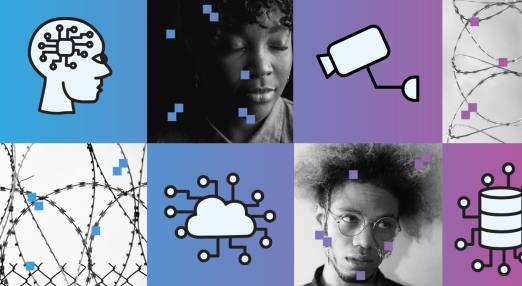When technology is the problem, not the solution: Lessons from harmful consequences of techno-solutionism in digital surveillance
AI-powered surveillance systems are being deployed globally - from Israel and Russia to EU member states. These systems target marginalised communities under the guise of improving security and efficiency. To rectify these harms, we must challenge techno-solutionist narratives and rethink why and how technology is used, and center human rights.
Filter resources
-

When technology is the problem, not the solution: Lessons from harmful consequences of techno-solutionism in digital surveillance
AI-powered surveillance systems are being deployed globally - from Israel and Russia to EU member states. These systems target marginalised communities under the guise of improving security and efficiency. To rectify these harms, we must challenge techno-solutionist narratives and rethink why and how technology is used, and center human rights.
Read more
-

Digital trade: the new frontline in the fight for our rights
The EU is signing digital trade deals that could undermine fundamental rights and block oversight of software systems shaping our lives. From data protection to algorithmic accountability, these agreements risk empowering opaque systems - used by both companies and governments - at the expense of the people most affected by them.
Read more
-

Hungary’s new biometric surveillance laws violate the AI Act
This blog post is a legal analysis of new legislation in Hungary that uses facial recognition technology in a manner that violates the EU Artificial Intelligence Act. Such use of this technology risks discouraging people from exercising their fundamental rights undermining their trust in democracy.
Read more
-

Civil society to European Commission: Act now to defend fundamental rights from Hungary’s Pride ban and the use of facial recognition against protesters
EDRi, along with a broad coalition of civil society organisations, demands urgent action from the European Commission on Hungary’s new law banning Pride marches and permitting the use of live facial recognition technology targeting protesters.
Read more
-

Why the new Europol regulation is a Trojan Horse for surveillance
The EU Commission’s proposal for a new Europol Regulation as part of the recast of the ‘Facilitator’s Package’ is a pretext for unchecked expansion of power and resources for Europol, the EU’s policing agency, at the expense of those they claim to protect.
Read more
-

The EDPB’s Rorschach Test: What the data protection body’s Opinion on AI training Means for GDPR Enforcement
In December 2024, the European Data Protection Board (EDPB) released a much-awaited Opinion on AI model training. While the Opinion reaffirmed GDPR principles and underscored the need for robust safeguards, its ambiguities may leave room for regulatory evasion, reinforcing the ongoing struggle between data protection rules and commercial AI development wishes.
Read more
-

A new tool helps Slovenian public identify AI-generated content and educates about its risks
EDRi affiliate Danes je nov dan recently launched Razkrinkaj.ai – an online tool that allows users to test their ability to recognise AI-generated content through an interactive quiz while learning about the risks and challenges associated with it.
Read more
-

European Commission guidelines on the AI Act implementation must center human rights and justice
Over 25 civil society organisations and experts actively following the implementation of the Artificial Intelligence (AI) Act are urging the European Commission’s AI Office to ensure that the upcoming Commission guidelines clarify fundamental rights as the central guiding basis to enable meaningful AI Act enforcement. They also note note the various shortcomings of the Commission’s consultation process.
Read more
-

New European Commission confirmed: our takeaways on what to expect
On 1 December 2024, the new political leaders of one of the EU’s most powerful institutions – the European Commission – officially took office. As part of their nomination process, they shared their digital visions for the next five years. Spoiler alert: the fight for digital rights will be as important as ever, with data protection, encryption and privacy all on the chopping block.
Read more
-

A new registry empowers the Slovenian public to monitor the use of AI systems by public institutions
EDRi affiliate Danes je nov dan recently launched their Public Sector AI Registry. The platform provides insight into the use of AI systems by Slovenia’s public institutions and highlights the lack of transparency from officials.
Read more
-

German federal health minister, Shein and Deutsche Bahn ‘awarded’ for worst privacy and data protection offences
In October 2024, EDRi member Digitalcourage held the annual gala for the German BigBrother Awards. The unfortunate “winners” included a minister in the federal government, the police and interior minister in one German state, two international online retailers, a fundamental infrastructure provider and a trend.
Read more
-

EDRi and members take EU decision-makers through 20 years of digital policy
This September, EDRi, Access Now and ARTICLE 19 took Parliamentarians through a rollercoaster ride of all things digital policy in the European Union. From the early internet and initial experiments in platform regulation, through more recent regulatory innovations, and finally to questions of security and surveillance, we shared a digital rights perspective of the good, the bad and the ugly of digital policy in the EU.
Read more
